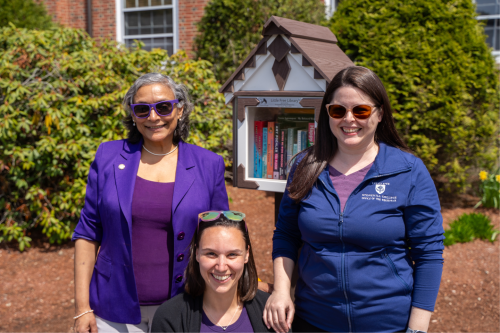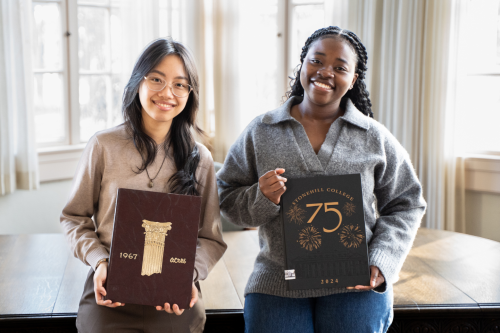Fostering Happiness at the Hill
Associate Professor of Communication & Media Studies Monique Myers shares details about a Stonehill course that puts a smile on students’ faces.
It was during one of the most trying times in world history that Associate Professor of Communication & Media Studies Monique Myers first became interested in Happiness Studies, a relatively new interdisciplinary field that encompasses psychology, philosophy, neuroscience and more.
“I have been piqued by the study of happiness since I heard it was the most popular course in Harvard University’s history, but it was during COVID that I decided I wanted to learn more about this line of inquiry,” Myers says.
After spending the pandemic delving into scholarship on the world’s relationship to the concept of joy, Myers began sharing her findings with members of the Stonehill community. She taught her first class on “Happiness & Communication” in fall 2021 and has offered a section of the course at Stonehill every autumn since then.
The class explores how happiness and communication are intertwined through an investigation of factors that promote happiness. By the time students complete the course, it is intended that they can put into practice effective skills that maximize their well-being and that of others.
Beyond her students, Myers has started sharing her scholarship with other audiences, including attendees at a 2024 conference in Paris, France. Additionally, she is currently teaching a Happiness Studies course for senior citizens in partnership with the Martin Institute for Law & Society.
At the start of the classes and workshops she leads, Myers often addresses the question of why people should study happiness. She typically notes that understanding this emotion is important because fostering happiness has many benefits — it boosts our immune system, increases our longevity, and maximizes our energy, engagement and motivation. Furthermore, “it just plain makes us feel good,” she says.
Though Myers has spent the past several years helping students discover the tools needed to unlock a certain “joie de vivre” (French for "joy of living"), she cautions that Happiness Studies is “not about becoming happily ever after.”
“It is a field that attempts to improve folks’ happiness levels, even a little,” the faculty member says. “With anxiety and depression on the rise, especially in our youth, any attempt to bring happiness to the forefront of our consciousness is well worth the effort.”
There are many everyday things that students can do to help cultivate a happy college experience, according to Myers. These actions include exercising every day if possible and getting a minimum of 7 to 8 hours of sleep each night.
The Stonehill scholar also suggests that students join clubs and try to meet new people, as “strong, mutually fulfilling personal relationships are the number one predictor of happiness.”
Lastly, Myers remarks that people should consider mapping out their long-term and short-term goals.
“Happiness takes work,” she says. “You need to be committed to the goals and actions you set for yourself. It’s also important to dedicate yourself to practicing compassion, both for yourself and others.”


